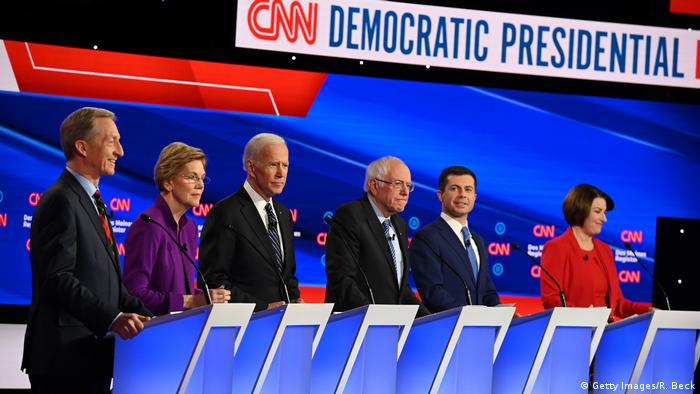
Competition among Democratic candidates is still healthy at this point. However, if the race is drawn out for too long, the Democrats will face serious problems in the fight against Donald Trump, says Carla Bleiker.
Impeachment, health insurance, trade policy … At 2020’s first Democratic presidential debate on Tuesday, Jan. 14, the six candidates got the opportunity to present their “greatest hits.”
The only new topic candidates discussed was the tense situation between the U.S. and Iran, which escalated at the start of the year when Iranian Gen. Qassem Soleimani was killed by the U.S. in a drone strike. Elizabeth Warren and Bernie Sanders want to withdraw all U.S. troops from the Middle East as soon as possible. Joe Biden and Pete Buttigieg would like to leave some troops where they are for the time being. However, all four, as well as Tom Steyer and Amy Klobuchar agree on one thing – Donald Trump’s policies are not at all great.
Broad Agreement, Differences in the Details
One could see that many of the topics discussed followed a similar pattern. Candidates did not agree on the details, and they used every opportunity they could to politely but firmly point out these differences of opinion. However, the candidates did agree on a general policy direction. Warren noted this, too. “We Democrats may argue among each other about the best way to do health care, but we’re going to be up against a Republican incumbent who has cut health care for millions of people,” said Warren, a Massachusetts senator, when the debate turned to health care, adding “I’ll take our side of the argument any day.”
Nevertheless, discussion later became heated, leading to the mention of something that Democrats should keep in mind if they want to have a chance against Trump in the November election. The day before the debate, U.S. media reported that Sanders had told Warren at a meeting in December that a woman could not win the presidential race. During the debate on Tuesday, Jan. 14, Sanders vehemently denied he had ever said such a thing, but Warren stuck to her side of the story. In his effort to disprove the accusation, the Vermont senator declared that he would support all his fellow candidates in the fight to oust Trump, saying, “if any of the women on this stage or any of the men on this stage win the nomination, […] I will do everything in my power to make sure that they are elected.”
Sounds like a good promise to make – but, coming from the lips of Bernie Sanders, it is meaningless. In the primary campaign against Hillary Clinton four years ago, it was Sanders who dragged out the race unnecessarily by refusing to drop out, which benefited the Republicans; and the many Sanders voters who decided to stay home on Election Day instead of going out to vote for Clinton contributed to Trump’s win.
Egos Must Be Put Aside, or Trump Will Win Again
When Sanders referred to Clinton to demonstrate his enthusiasm for female candidates, and emphasized that she had won 3 million more popular votes than Trump, it almost sounded like he was mocking her.
If the Democrats want to win in November, all remaining candidates will have to be willing to put aside their egos. When the person who will win the caucuses becomes clear, beginning on Feb. 3 in Iowa and continuing until June, the other candidates must be willing to relinquish their dream of becoming president, and should not wait until just before the Democratic National Convention in July to drop out. The Republicans already have a huge advantage, as they can focus their campaign on the incumbent president. If Democratic voters are again as divided as they were in 2016, Trump is guaranteed a second victory.

Leave a Reply
You must be logged in to post a comment.